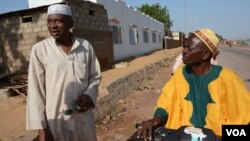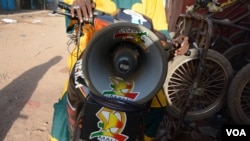A motorbike rider issuing warnings to fellow townspeople is emblematic of the social structures already in place that have proved helpful in the fight against Ebola in West Africa.
A toddler traveling with her grandmother from Guinea died of the disease two weeks ago in the Malian town of Kayes. But since then, griots, or praise singers — important in their role as advisers and communicators — as well as local healers and religious leaders have been spreading awareness of the disease and how to guard against it.
As a result, almost two weeks into the incubation period for 79 hospital workers and family members in Kayes, no new cases of the disease have been reported.
One griot, Ibrahim Sacko, has done his part by crisscrossing Kayes on his motorbike, using a sound system mounted on top to give instructions to people and tell them to wash their hands.
“I saw what happened in Mali’s neighboring countries, in Guinea, Sierra Leone and Liberia, and it scared me," Sacko said. "When I heard that the disease had arrived in Kayes, I acted immediately."
Sacko began his rides the day after it was reported that the baby girl had tested positive for Ebola. He said he felt compelled to do something.
“Mali’s a poor country. We lack the means to deal with Ebola," he said. "However, by changing people’s mindset and behavior, we can limit the problem.”
Humanitarian groups step up
While the authorities' initial response may have been swift, efforts to spread awareness and build the capacity to receive more suspected Ebola cases and patients have been slow and hampered by bureaucracy.
Humanitarian organizations have taken over the response, setting up a treatment center as well as training medical staff and volunteers to monitor the 79 people in isolation.
Tracing of possible contacts and new cases is limited to radio spots asking people to report to a hospital or local health clinic.
Those in isolation are at either their homes or the Fousseyni Daou hospital. If none shows symptoms of the disease within the 21-day incubation period for the virus, Mali's first encounter with Ebola might be limited to the single case.
“I believe our team did the best job they could with the limited resources we had at the time,” said Toumani Konare, general director at the Kayes hospital.
“It’s true we couldn’t have done it without help from our international partners," the doctor said. "We must also remember it’s not over yet. We’re still waiting for the 21 days, the time when people in isolation should be symptom-free, to pass.”
Mali’s brief bout with Ebola began when the grandmother, a 43-year-old woman from Kayes, traveled hundreds of kilometers to Beyla, a village in southern Guinea. Her daughter had married a Guinean man and moved to Guinea before the Ebola outbreak started there last December.
When the husband, a health worker, died of Ebola-like symptoms, the grandmother decided it was time to bring her two grandchildren, ages 5 and 2, back home to Mali.
When they reached Kayes on October 20, the 2-year-old was already showing symptoms. The grandmother took the girl to a marabout, a traditional healer, but he didn’t recognize the symptoms.
It wasn’t until the next day that a neighbor, a retired health worker, urged the family to take the girl to the hospital, where she died three days later.
“You can’t say we weren’t prepared,” said Dr. Issa Sanogo, deputy director at the health department in Kayes. “We detected the case.”
Extra training
At the time, only two out of the hospital’s 160 staff members had received training to detect Ebola and handle patients. In two weeks, staff from Médecins Sans Frontières, the World Health Organization and the Alliance for International Medical Action have trained 40 staff members.
“Before, we had the training and the knowledge but we didn’t know how to handle any cases because we never had any," said Dr. Abdouramane Koungoulba, the pediatrician who first treated the girl. "Now, after the training, we have much more experience, both mentally and physically,”
In Kayes, life is slowly returning to normal. The chlorine handwashing stations are still present, but an outstretched hand to offer a greeting is no longer met with a terrified look.
During the first days people did change their behavior, said Sacko, the griot. Some Malian customs, however, such as sharing tea and having food from the same plate, never stopped.
“It’s a risk, but it’s our custom,” he said.
In all, Mali must wait for two incubation periods, or 42 days, before it’s declared Ebola-free. Meanwhile, the griot continues to tour Kayes on his motorbike.












